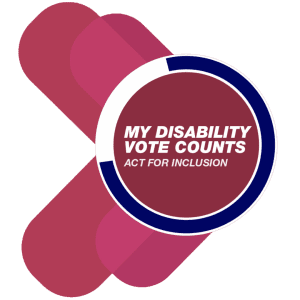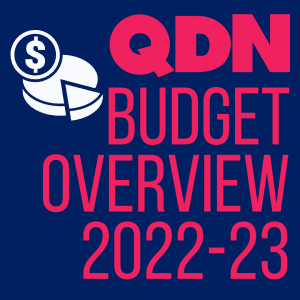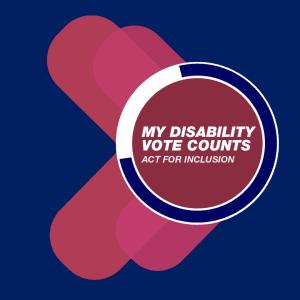QDN Overview of the Budget 2022-23
The Morrison Coalition Government handed down its third budget on Tuesday 29 March 2022. QDN has produced this overview for members detailing the highlights for people with disability in this budget.
QDN will keep monitoring the progress of these budget announcements as more information comes to hand and will continue to keep our members informed. Information contained in this QDN Overview has been taken from the Budget papers.
Read the full budget papers here »

One-off cost of living payment
There will be a one-off income support tax-exempt payment of $250.00. The payment will be made in April 2022 to eligible recipients of the following payments and to concession card holders:
- Age Pension
- Disability Support Pension
- Parenting Payment
- Carer Payment
- Carer Allowance (if not in receipt of a primary income support payment)
- Jobseeker Payment
- Youth Allowance
- Austudy and Abstudy Living Allowance
- Double Orphan Pension
- Special Benefit
- Farm Household Allowance
- Pensioner Concession Card (PCC) holders
- Commonwealth Seniors Health Card holders
- Eligible Veterans’ Affairs payment recipients and Veteran Gold card holders.
It will be paid automatically to all eligible pensioners, welfare recipients, veterans and eligible concession card holders in April 2022.
NDIS
The Federal Budget's announcement for people with significant disability and their families is the increased funding for the NDIS across the forward estimates. The NDIS will provide $33.9 billion to over 500,000 Australians who have permanent and significant disability in 2022‑23, growing to $44.6 billion in four years.
A measure to increase the number of NDIS participants in Queensland, first reported in the 2019-20 Mid-Year Economic and Fiscal Outlook (MYEFO), has its final injection of funding ($7.6 million) in 2022.
Quality & Regulation
$10.8 million in 2022-23 for the Cross-Agency Taskforce on Regulatory Alignment to implement the next stage of regulatory reforms across the aged, disability and veterans’ care sectors.
Health – including COVID-19 measures
Telehealth: From 1 January this year, Telehealth was made a permanent part of Medicare. This will potentially support more people with disability to have easier access to quality health care.
COVID-19: To assist people with disability to monitor for COVID-19 and manage transmission risks, the Government is providing 5.5 million RATs to National Disability Insurance Scheme (NDIS) Supported Independent Living residents and workers.
The Government will provide the continued distribution and uptake of COVID-19 vaccines across Australia. Funding includes $800.8 million over 2 years from 2021-22 for the administration of primary and booster doses in primary care settings, pharmacies, aged and disability care facilities, and Aboriginal and Torres Strait Islander and culturally and linguistically diverse communities.
Pharmaceutical Benefits Scheme (PBS): From 1 July 2022, PBS Safety Net thresholds will be reduced. As a result, patients will reach the safety net with around 12 fewer scripts for concessional patients and two fewer scripts for general patients in a calendar year.
$2.4 billion will be funded over four years for new and amended listings to the PBS will make treatments more affordable. This includes treatments for cystic fibrosis, spinal muscular atrophy, and bowel cancer.
Women’s Health: $330.6 million in this Budget to improve health outcomes for women and girls in a range of priority areas, including funding for maternal, sexual and reproductive health, including support to women with endometriosis and pelvic pain. The Government is providing $58.3 million to improve diagnosis, treatment and support, including establishing endometriosis and pelvic pain clinics.
Mental Health
Reforms in mental health services will aim to have a greater focus on prevention and early intervention supports through establishing community-based, multidisciplinary treatment centres and investing in digital mental health services.
Autism
$1.2 million in 2022-23 to support Amaze Incorporated and Autism Awareness Australia in expanding the existing ‘Autism: What Next?’ website to provide resources to help individuals and families navigate the first year following an autism diagnosis.
Responding to violence against women
$1.3 billion is committed towards ending all forms of violence against women and children. This will support implementation of the new National Plan to End Violence against Women and Children 2022‑2032.
This funding also supports other initiatives such as the establishment of a new Domestic Violence Commission and $3.4 million to address sexual harassment in the workplace.
Funding also includes $104.4 million from 2022-23 to continue and expand the role of the national prevention organisation ‘Our Watch’, to improve its reach in diverse communities including the LGBTIQA+ community, the disability community and those with culturally and linguistically diverse backgrounds
Women’s Leadership
Women’s Leadership and Development Program (WLDP) Get Skilled Access ($0.7 million over three years to 2022-23), which builds leadership capability in current and retired women athletes with disability, and increases the talent pool for board selection and executive and administration roles in sporting organisations.
Employment & Enterprise Growth
There will be $6.1 million over 2 years from 2022-23 for a national advertising program to promote the Field (formerly known as’ WorkAble’) to assist job seekers with disability to find, and engage with employment opportunities.
The Government will provide $153.5 million over 5 years from 2021-22 to address workforce shortages, support job seekers to find employment, and attempt to make it easier for vulnerable Australians to participate in the workforce. Funding includes $44.6 million over 2 years from 2022-23 to continue support for businesses who employ mature-aged Disability Employment Services program participants through the Restart Wage Subsidy.
$6.9 million over 3 years from 2022-23 to support co-operatives and other collaborative business models access the aged, disability and veterans’ care sectors. The Business Council of Co-operatives and Mutuals will be funded to support the start-up and development of cooperative and mutual enterprises, and deliver business resources and professional support.
What’s missing?
While the aged care sector will benefit from an injection of almost $50 million to subsidise 15,000 vocational education and training places for those who are already in or are looking to enter the aged care workforce, it is disappointing this does not extend to the disability sector. This is particularly so given the challenges the sector has faced in growing its workforce to meet the growing demands for supports and recent challenges in ensuring a responsive workforce during the COVID-19 pandemic.
It is also concerning to see no national commitment to the supply of affordable, accessible, and social housing for people with disability. QDN has advocated for years for a national housing strategy for people with disability which includes a wide range of responses to meet the housing needs of people with disability.
There is also no specific investment in disaster resilience to improve the safety and well-being of Australians with disability before, during and after a disaster or emergency. QDN joined forces this week with People with Disability Australia (PWDA) and a coalition of 40 leading disability rights, advocacy and peak body organisations has endorsed a pre-election open letter to politicians across the country demanding a new approach and more resources for improving disaster and emergency responses for people with disability.
Read more about QDN's Federal Election Campaign here »

Don't forget to register
QDN’s member only Federal Election briefing event where we will discuss the key issues and actions on how we can all work together to make sure all parties are acting for inclusion.

